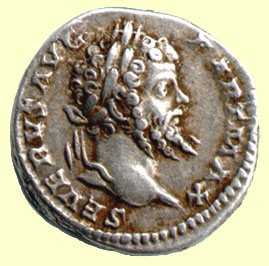 Contents --
Previous Article --
Next Article
Contents --
Previous Article --
Next Article
An African by birth, Septimius Severus joined the Roman army as a young man and worked his way up through the ranks. He was a superstitious man and often consulted astrologers concerning his future. According to the accounts given in the Historia Augusta, or the Lives of the Later Caesars, there were many favorable omens that predicted that Septimius would one day become emperor. He married the brilliant and beautiful Julia Domna, whose horoscope also predicted that she would marry an emperor, even though Septimius was a young army officer at the time. She was the daughter of a high priest of Elagabal, a god that was popular in Syria during the Third Century A.D. Domna, like other women of the Severan Dynasty, held a position of great power during the reign of Septimius Severus and his sons.
Severus was in command of the Eastern legions when news reached him of the murder of Pertinax. Pertinax had been popular with the army, and avenging his murder was an ideal excuse for Septimius Severus to rebel against the weak and despised Didius Julianus and try to seize the throne for himself. Severus first had to deal with two strong rivals who also were in rebellion at the head of Roman legions. Clodius Albinus was the governor of Britain and Pescennius Niger was in charge of the legions on the river Danube.
Septimius Severus spent much of his time away from Rome putting down rebellions and dealing with rivals. He even campaigned in Britain against the wild and unruly Scots who were harassing the civilized towns of Roman Britain. The legendary Scottish hero Fingal was supposed to have fought successfully against the Roman legions of Septimius Severus in defense of the cherished liberty of the Scots. Septimius Severus took his two sons, Geta and Caracalla to Britain with him in order to get them away from a life of luxury in Rome and expose them to the virtues of life in a rough Roman army camp. Severus died at York He told his sons to cooperate with each other in ruling the Empire together. The last words of advice to his sons he spoke as he lay dying in this Roman outpost so far from the civilized center of the empire expressed more a hope than a command. "Rule together as brothers, enrich the soldiers, and forget about everybody else."
Go to next article on Emperor Geta
Go back to previous article on Emperor Pescennius Niger